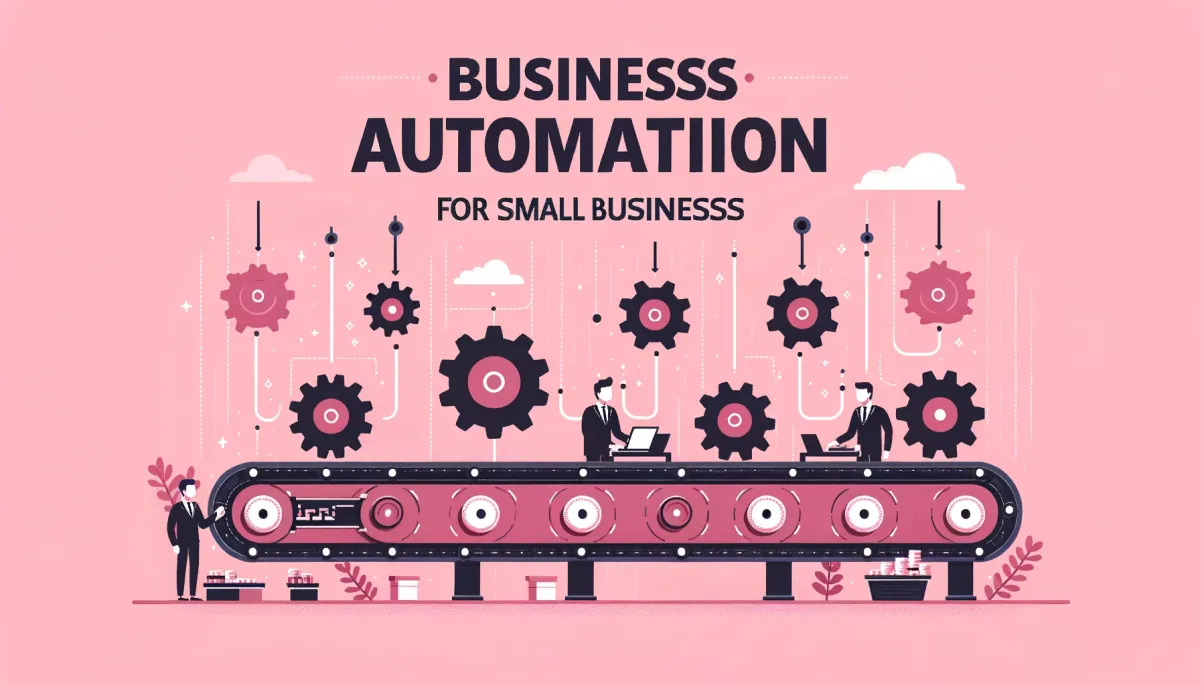Read Our Latest Blogs
Stay informed with our latest posts.

Business Automation for Small Businesses
Streamlining Success: Business Automation for Small Businesses
Introduction:
In today's fast-paced digital world, small businesses often face the challenge of keeping up with larger competitors. But with the dawn of business automation for small businesses, this playing field is being leveled. By integrating automated solutions, smaller enterprises are redefining efficiency and accelerating growth. Let’s delve deep into how business automation can transform the trajectory of small businesses.
Understanding Business Automation:
Business automation refers to the use of technology to perform repetitive tasks or processes in a business where manual effort can be replaced. It streamlines operations, reduces errors, and ensures that the best practices are consistently applied. For small businesses, this can mean significant cost savings, increased efficiency, and a more substantial bottom line.
Benefits of Business Automation for Small Businesses:
Efficiency Boost: Automated processes significantly reduce the time spent on repetitive tasks, allowing employees to focus on more value-driven operations.
Error Reduction: Automated processes are consistent and precise, greatly diminishing the chances of human errors which can be costly and time-consuming.
Cost Savings: While there's an initial investment in automation tools, the long-term savings in terms of labor costs, reduced errors, and increased efficiency provide a favorable ROI.
Improved Customer Experience: Automation can enhance customer service response times, personalize customer interactions, and streamline sales processes, leading to better customer satisfaction.
Data Insights: Many automation tools offer analytics, allowing businesses to gather insights on operations and customer behavior, aiding in informed decision-making.
Strategies for Implementing Business Automation for Small Businesses:
Start Simple: Begin by automating routine tasks that don't require complex decision-making. This could include scheduling, reminders, or even social media posting.
Integrate Systems: Ensure that your automation tools can integrate with other systems you use. This can help streamline data transfer and reducing manual data input.
Train Your Team: Implementing new tools will require your team to adapt. Invest time in training them to use these tools effectively.
Review and Optimize: Regularly review automated processes to ensure they're yielding the desired results. Adjust strategies as needed.
Why Small Businesses Need Automation: Key Reasons
Efficiency and Productivity:
Automation significantly reduces the time spent on repetitive and mundane tasks. By automating these processes, small businesses can focus on value-driven operations, thereby boosting overall productivity.
Cost Savings:
While there's an upfront investment in automation tools, the long-term benefits include reduced labor costs, fewer errors, and streamlined operations, leading to substantial cost savings over time.
Consistency and Quality Control:
Automated processes ensure consistency. Whether it's sending out invoices or updating customer data, automation ensures that the task is performed uniformly each time, guaranteeing quality and reducing errors.
Data Analysis and Insights:
Automation tools often come with analytics features. This provides businesses with invaluable insights into customer behaviors, sales trends, and other vital metrics, which can inform strategy and decision-making.
Enhanced Customer Experience:
Automation can lead to faster response times, personalized marketing campaigns, and consistent customer interactions, all of which significantly improve the customer experience.
Scalability:
As small businesses grow, the volume of tasks can become overwhelming. Automation allows businesses to handle increased workload or customer interactions without proportionally increasing operational complexities or costs.
Resource Optimization:
Small businesses often operate with limited resources. Automation allows these businesses to maximize their output from these resources, be it in terms of manpower, time, or capital.
Competitive Advantage:
In a fast-paced business environment, speed and agility matter. Automation can give small businesses a competitive edge by enabling them to respond quickly to market changes, customer demands, or operational challenges.
Error Reduction:
Manual processes are prone to errors, which can be costly for small businesses. Automation minimizes these risks by ensuring tasks are performed correctly each time.
Focus on Core Activities:
With routine tasks automated, business owners and employees can redirect their focus on core business activities, such as strategy development, product innovation, or building customer relationships.
Key Areas of Business Automation for Small Businesses:
Marketing Automation: Tools like MailChimp or HubSpot can automate email campaigns, segment customers, track user engagement, and even score leads. This ensures that marketing efforts are more targeted and effective.
Sales and CRM Automation: Platforms like Salesforce or Zoho CRM can automate various sales tasks such as tracking interactions, managing leads, and even forecasting sales.
Accounting and Finance Automation: Tools like QuickBooks can automate invoicing, manage expenses, and even handle payroll, ensuring that finances are accurate and up-to-date.
Customer Support Automation: Using chatbots or helpdesk software like Zendesk can help automate customer service inquiries, ensuring customers receive timely and consistent responses.
Inventory and Supply Chain Management: Platforms like InventoryPlus can automate inventory tracking, reorder triggers, and supply chain coordination.
Tips for Implementing Business Automation for Small Businesses:
Start Small: Try not to automate every single task at once. Begin with one or two processes, learn from the experience, and scale from there.
Train Your Team: Automation tools are only as good as the people using them. Ensure your team understands the tools and can use them effectively.
Regularly Review and Update: The business landscape is ever-evolving. Regularly review your automation strategies to ensure they remain relevant and effective.
Prioritize Security: Ensure that whatever tools or platforms you use are secure, compliant with industry regulations, and have provisions to protect your data.
Conclusion:
Business automation for small businesses isn't just a trend; it's a game-changer. By adopting automation, small businesses can operate more efficiently, save money, and position themselves for growth in an increasingly competitive market. And when it comes to leading tools for this transformation, FunnelBelle stands out. Offering intuitive solutions tailored for the needs of small businesses, FunnelBelle ensures that you're leveraging the best in automation technology.
In the age of digital transformation, those who harness the power of automation—and partners like FunnelBelle—will be better equipped to adapt, evolve, and succeed. Small businesses have a promising avenue in automation, ensuring that they're not just surviving but thriving in the modern business ecosystem.

Working hours
MONDAY TO FRIDAY: 9AM - 5PM
WEEKEND: 10AM - 5PM
© 2023 FunneBelle - All Rights Reserved,

Working hours
MONDAY TO FRIDAY: 9AM - 5PM
WEEKEND: 10AM - 5PM
© 2023 FunneBelle - All Rights Reserved,
